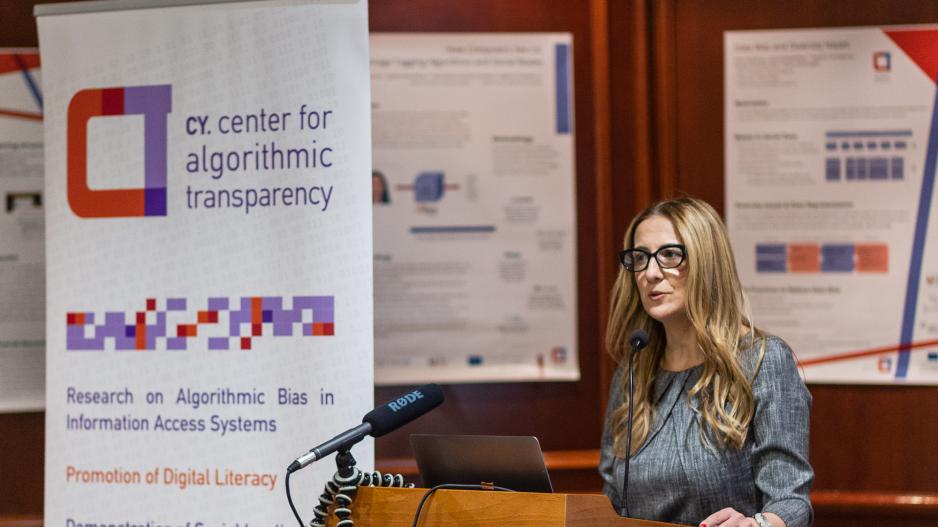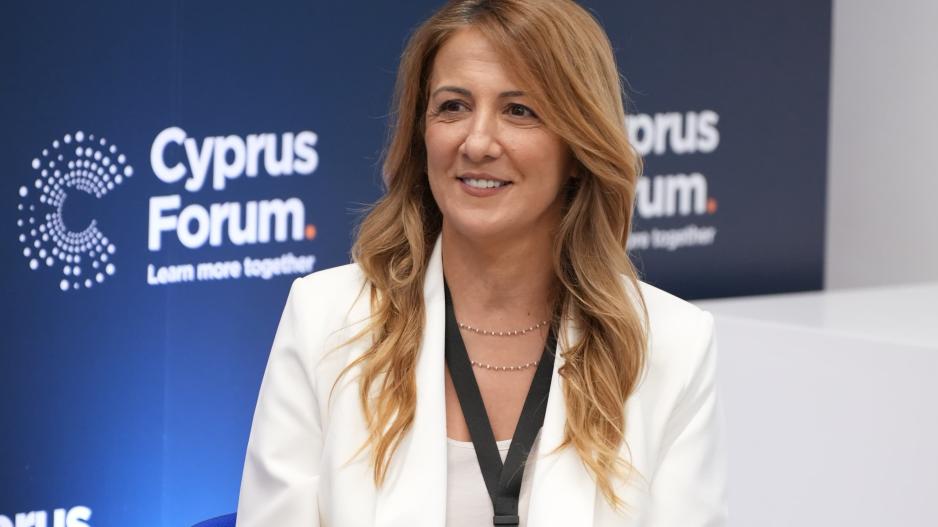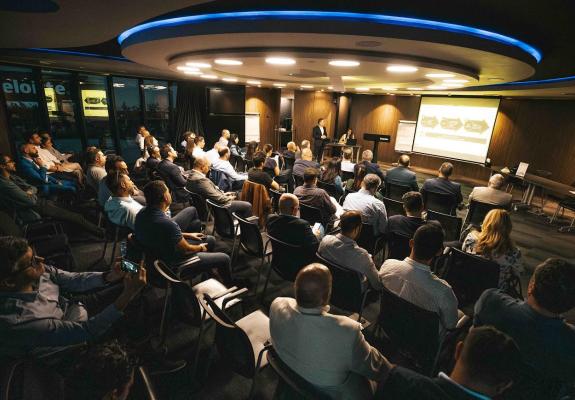Anna Prodromou on the Evolution of DEI in Cyprus and the Role of Businesses in Social Change
"Diverse and Inclusive Work Environments Are Twice as Likely to Meet Their Financial Targets"
In today's workplace, Diversity, Equity, and Inclusion have become critical components for fostering innovation, creativity, and overall business success. Recognizing the importance of DEI, we interviewed expert Anna Prodromou to delve deeper into these topics. Anna is a distinguished Consultant, Researcher, and Trainer in Communications and DEI. She is pursuing a Ph.D. in Human-Computer Interaction at the Faculty of Pure and Applied Sciences, OUC, and is the founder of Anna Prodromou Inc. Additionally, she serves as president of the WICZ+ Foundation, a non-profit organization dedicated to human rights.
From her extensive experience as a DEI Consultant and Trainer working with both local and international clients, Anna offers insights into how familiar Cypriot businesses are with DEI issues. She discusses the evolving landscape of DEI in Cyprus, driven by increasing interest due to its connection with ESG criteria. She also highlights the challenges organizations face when implementing DEI initiatives and how her tailored workshops address these challenges, fostering understanding, allyship, and effective strategies for building diverse teams.

Major international organizations are at the forefront of embracing DEI. Companies like Google, Microsoft, and Accenture, for example, have integrated such practices into their core strategies and operations. Rightly so, because research on the benefits of implementing DEI policies has shown that diverse and inclusive work environments are twice as likely to meet their financial targets. Inclusive and diverse teams are also more innovative, participatory, and creative, and organizations that invest in such policies have more loyal and satisfied customers. These initiatives also demonstrate a greater understanding of the inequities that exist in our societies as well as the benefits of adopting DEI practices.
Diverse and inclusive work environments are twice as likely to meet their financial targets
In Cyprus, DEI topics are still in their infancy. However, I am noticing a growing interest in the subject since DEI issues fall under the second pillar of ESG criteria, which are becoming increasingly discussed. I understand it might seem intimidating at first, which is why I start with a DEI assessment and roadmap to draft tailor-made workshops that can spark people's interest. These workshops help participants understand the impact of language, recognize the importance of allyship, and offer strategies for building diverse teams. I've seen people come to the first day of the workshop with reservations, only to leave with a clearer perspective and a renewed sense of purpose. People crave this type of interaction, even if it initially challenges their perspectives. It’s like stepping outside of your usual frame of reference and expanding your understanding.
Resistance to change is common, both from employees fearing loss of privilege and leaders skeptical of DEI’s benefits. Humans are creatures of habit and often find comfort in the familiar. Change, especially one that challenges deep-seated norms and privileges can be daunting. To navigate this, it’s crucial to secure commitment from leadership and foster open dialogue with employees.
Another challenge is the lack of understanding, often due to misconceptions about DEI. Many people mistakenly believe that DEI initiatives are about lowering standards or favouring certain groups over others. These are the exact misconceptions that I address through my workshops.
Resource constraints, both financial and human, can also slow progress. This is significant, especially for small to medium-sized companies, which constitute the majority of businesses in Cyprus. Yet with strategic planning, meaningful progress can be achieved even with seemingly limited resources.
One of the most impactful projects in my recent career was my collaboration with the Centre for Algorithmic Transparency in Cyprus (CyCAT) in 2018. CyCAT is an interdisciplinary research centre at the Open University of Cyprus dedicated to informing and educating people about algorithmic bias and collaborating with researchers worldwide. I had the privilege of drafting and implementing their communications strategy. Through my research to prepare for the project, I became fascinated by the subject, which inspired me to pursue a PhD.
Currently, I am a PhD candidate in the Faculty of Pure and Applied Sciences on the Doctoral Programme, of the OUC, Human-Computer Interaction. Bridging academia and the workplace, my research spans Artificial Intelligence (AI) tools and organizational culture.
This experience not only broadened my understanding of AI — which is let’s be honest, the new frontier — but also set me on a path of academic and professional growth that continues to shape my career today.

Absolutely! While organizations around the world are adopting DEI values, they are also increasingly integrating AI technologies to enhance operations and customer experiences. These AI technologies—like those that scrape the internet, use neural networks to analyze texts, identify patterns, and generate content—are really pushing the boundaries of what's possible. Take Generative AI, for example. This type of unsupervised machine learning can create text, images, and videos and is used in applications like ChatGPT, Midjourney, and DeepBrain. It's incredibly useful, offering benefits like reducing human error, automating repetitive tasks, managing large data sets, and improving workflows.
However, there's a flip side. These AI tools can unintentionally perpetuate existing biases, especially when they are trained on non-representative data sets. This can lead to biased decision-making that disadvantages minority groups. As AI becomes more integrated into organizations' operations and products, we need to be vigilant about embedding DEI principles in the development and use of these technologies. Are organizations demanding transparency in the AI systems they use? Are they aware of the potential flaws regarding fairness and inclusivity of the AI technologies they are adopting? These concerns underscore the need for a proactive approach to ensure DEI is at the heart of AI development.
This connection between DEI and AI is exactly what my work aims to address. As a researcher, I strive to ensure technology serves everyone equitably.
My involvement in feminism and activism was profoundly shaped by my upbringing in Cyprus in the late 70s. However, the real turning point came in 2013 when I moved to the United States, believing it would be a permanent move. Living there as an immigrant and feeling nostalgic for Cyprus had a significant impact on me. In 2019, upon my return to Cyprus, my book, "Women in Conflict Zones," came to fruition and was published. It features interviews with women from various communities in Cyprus. The term 'conflict' in the book's title holds a special meaning, extending beyond war zones to encompass situations where women's human rights are questioned or violated.
The WICZ+ Foundation represents a transformative evolution of this work. The foundation is dedicated to promoting women's rights and enhancing their civic participation in Cyprus. Moreover, it extends its empowering efforts to other marginalized and disenfranchised communities, including individuals from the LGBTQI+ community, persons with disabilities, and those belonging to migrant and asylum-seeker communities.
This initiative aligns with my ongoing efforts in AI and DEI, where inclusivity and equity are paramount. Both my academic research and foundation work aim to create a more inclusive and equitable society, whether through technology or direct community support.
Conventional wisdom suggests that governments and NGOs are the strongest catalysts for social progress, but I believe companies can be just as instrumental. Traditionally, brands and companies rarely saw themselves as agents of social change. However, this perspective is evolving. Why? Because they’re recognizing the need to connect with their customers based on genuine, shared values, rather than superficial marketing efforts or corporate social responsibility initiatives. Change is happening.
Businesses have a unique capability that other entities such as universities or the church don't
Businesses have a unique capability that other entities such as universities or the church don't. Cyprus has only three state universities and six private ones, with around 50,000 students in total. As for the Church, even if it fully practiced acceptance and understanding, only a small number of us attend regularly.
Businesses, on the other hand, engage half a million people in Cyprus' workforce alone—individuals of different ages, genders, religious beliefs, sexual orientations, and physical abilities. All are united by the need to earn a living. Why not leverage this incredible diversity to the fullest? By doing so, businesses can lead society forward and make a real difference in creating a more inclusive and equitable society.







